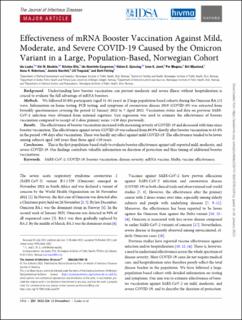| dc.contributor.author | Laake, Ida | |
| dc.contributor.author | Skodvin, Siri Nærland | |
| dc.contributor.author | Blix, Kristine | |
| dc.contributor.author | Caspersen, Ida Henriette | |
| dc.contributor.author | Gjessing, Håkon K. | |
| dc.contributor.author | Juvet, Lene Kristine | |
| dc.contributor.author | Magnus, Per Minor | |
| dc.contributor.author | Mjaaland, Siri | |
| dc.contributor.author | Robertson, Anna Hayman | |
| dc.contributor.author | Starrfelt, Jostein | |
| dc.contributor.author | Trogstad, Lill | |
| dc.contributor.author | Feiring, Berit | |
| dc.date.accessioned | 2023-02-15T13:20:00Z | |
| dc.date.available | 2023-02-15T13:20:00Z | |
| dc.date.created | 2023-01-30T13:41:17Z | |
| dc.date.issued | 2022 | |
| dc.identifier.issn | 0022-1899 | |
| dc.identifier.uri | https://hdl.handle.net/11250/3051161 | |
| dc.description.abstract | Background
Understanding how booster vaccination can prevent moderate and severe illness without hospitalization is crucial to evaluate the full advantage of mRNA boosters.
Methods
We followed 85 801 participants (aged 31–81 years) in 2 large population-based cohorts during the Omicron BA.1/2 wave. Information on home testing, PCR testing, and symptoms of coronavirus disease 2019 (COVID-19) was extracted from biweekly questionnaires covering the period 12 January 2022 to 7 April 2022. Vaccination status and data on previous SARS-CoV-2 infection were obtained from national registries. Cox regression was used to estimate the effectiveness of booster vaccination compared to receipt of 2-dose primary series >130 days previously.
Results
The effectiveness of booster vaccination increased with increasing severity of COVID-19 and decreased with time since booster vaccination. The effectiveness against severe COVID-19 was reduced from 80.9% shortly after booster vaccination to 63.4% in the period >90 days after vaccination. There was hardly any effect against mild COVID-19. The effectiveness tended to be lower among subjects aged ≥60 years than those aged <50 years.
Conclusions
This is the first population-based study to evaluate booster effectiveness against self-reported mild, moderate, and severe COVID-19. Our findings contribute valuable information on duration of protection and thus timing of additional booster vaccinations. | en_US |
| dc.language.iso | eng | en_US |
| dc.publisher | Oxford University Press | en_US |
| dc.rights | Attribution-NonCommercial-NoDerivatives 4.0 Internasjonal | * |
| dc.rights.uri | http://creativecommons.org/licenses/by-nc-nd/4.0/deed.no | * |
| dc.title | Effectiveness of mRNA booster vaccination against mild, moderate, and severe COVID-19 caused by the Omicron variant in a large, population-based, Norwegian cohort | en_US |
| dc.type | Journal article | en_US |
| dc.type | Peer reviewed | en_US |
| dc.description.version | publishedVersion | en_US |
| dc.rights.holder | Copyright 2022 The Author(s) | en_US |
| cristin.ispublished | true | |
| cristin.fulltext | original | |
| cristin.qualitycode | 2 | |
| dc.identifier.doi | 10.1093/infdis/jiac419 | |
| dc.identifier.cristin | 2118441 | |
| dc.source.journal | Journal of Infectious Diseases | en_US |
| dc.source.pagenumber | 1924-1933 | en_US |
| dc.identifier.citation | Journal of Infectious Diseases. 2022, 226 (11), 1924-1933. | en_US |
| dc.source.volume | 226 | en_US |
| dc.source.issue | 11 | en_US |

